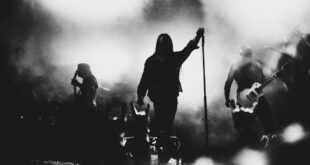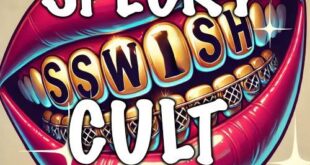
While Post Pop Depression has been billed as a collaboration, it’s Iggy Pop‘s name on the album’s marquee and spine. Producer, multi-instrumentalist, and co-writer Joshua Homme and Pop are both revered musicians and celebrated collaborators in their own realms. Homme worked with John Paul Jones and Dave Grohl in Them Crooked Vultures, and David Bowie was a key foil for Pop’s most revered two-album stint, The Idiot and Lust For Life. Due, or some may say overdue for a project, Pop and Homme have shared fitting discourse and musical intercourse.
Art rock, New Wave, Detroit streetwise rock, desert rock, baroque pop, and even a little Motown melodic sensibility and jazzy flair bare a seething underbelly and morbid fascination with the attrition of life, the decadence of form, and the finality of death. Musically diverse, transitional, and vocally near-monolithic, the nine track disc presents a gloomy specter looming large, peppered with sensual but increasingly brief breaks in the clouds.
Titled by co-writer and multi-instrumentalist Dean Fertita, Post Pop Depression is a subtle, expert wordplay on events which may have affected various members of the band. Homme’s post-op (leg surgery) depression is well chronicled elsewhere. Even more subtly, the title underscores the album’s end game: that this may be Pop’s swansong, his final foray into the world of recorded rock music. Thus, Pop’s fans may feel some sadness and loss when he departs (sans adieu, spelled out in “Paraguay”).
The album mates Detroit’s sooty, off-the-cuff garage rock to the polish of desert rock and art; it’s neither in pure form, more a dynamic, living hybrid. The band sounds tight and well-rehearsed, playing to serve the songs. The engineering, mixing, and mastering are perfect for the album: crisp, clean, spacious, and just dirty enough at the right moments to lend an air of romance and atmosphere to the music. Bleakness, a pervasive gray hinting at a private hell, seeps insidiously into every song, almost subconsciously supporting the title. Not a tune goes by without some culture-of-optimism backlash or rebuttal. Shrouded in darkness, this is an album that’s as existential (“American Valhalla”, “Break Into Your Heart”) as it is contemporary (“Gardenia”, “Paraguay”). Overall, the album has a somewhat narrow range, to accommodate Pop’s stately baritone lead vocal. The musical textures thus end up fairly uniform, with “Vulture” being the outlier. Moderately even tempered, the music seems more a vehicle for the lyrics then an instrumental call to arms.
The album’s opener, “Break Into Your Heart”, dims the lights, setting the overall inky yet melodic tone, relaxed tempo, and ambiance. It doesn’t have flash, but it has plenty of sparkle, and the music’s ominous, veiled, stormy build adds to the enjoyment. The song is note-sparse, yet well decorated; a little ambling or wandering, without lethargy. The layering and arrangement are moderately complex, especially the guitar, synth, and piano motifs. The song ‘tops and tails’ itself with near a capella, vocal-forward refrains. Somewhat clean electric guitar decorates the melody’s topline – this is a big portion of the polished desert rock vibe. Homme picked up on that a long time ago, and has used it to it’s fullest advantage for years. Heavy, aggressive Moog synth backs up the bass guitar, beginning an ominous undercurrent which shadows the cuts.
The universal, human struggle with the concepts of the end of life, death, and what lies beyond run through the album like a brooding, black river. The concept of mortality – professional and physical demise, inclusive – is explored at length. With cold scientific agnosticism all the rage currently, Pop again flies in the face of his adversaries. He takes a religious route to the conclusion of his life, with “American Valhalla” implying both an existence in the hereinafter, and a higher-power gatekeeper to gain access to said. He later reconciles this, conceding, amid “Chocolate Drops” that there’s nothing in the dark. As someone who’s indirectly crowned himself “America’s greatest living poet”, Pop deftly and masterfully sculpts and bends language to do his bidding. Simile and repetition are used to great effect in “Sunday”. Listeners remain free to make up their own minds: Pop’s lyrics are open-ended enough to allow for intimacy and internalization.
“American Valhalla” boasts a swanky, catchy desert rock (think Queens of the Stone Age‘s “You’ve Got a Killer Scene There, Man” and “I Never Came”, from Lullabies To Paralyze) atmosphere. A droning, robotic riff is the song’s foundation, similar to and evocative of Pop’s earlier works, such as “The Passenger”. The tune is very sparse, sporting Matt Helders‘s solid drum line married to a slightly overdriven, slippery bass guitar. This somewhat melodic framework allows a ton of space for Pop’s slightly echoic, reverberating vocal delivery, which is more sung and less ‘spoken’ then in “Gardenia”. The spoken, raspy, deep, creepy coda – “I’ve nothing but my name” – feels like an apt postscript.
Not only mortality, but growing obsolescence or irrelevance occupies the thoughts of Pop and collaborator, lyrical henchman Homme. While Homme addressed this in “…Like Clockwork” from Queens of the Stone Age’s 2013 disc of the same name, Pop brings the topic up just as poignantly in “American Valhalla” and “Sunday”. Cognitive dissonance is encouraged throughout. The same lyricist who says “please” in “American Valhalla” bemoans manners and mores, and unflinchingly tells his detractors to go fuck themselves in “Paraguay”. The same survivor and veteran of one music industry upheaval after another doesn’t want to lose his life tonight (“In The Lobby”), hangs on stubbornly (“Chocolate Drops”), and yet welcomes the end (“American Valhalla”, “Chocolate Drops”).
In a manicured soundscape dotted with foothills and valleys, Post Pop Depression has two peaks: instrumentally during “Sunday”, and lyrically during “Paraguay”.
“Sunday”, penned about that day of the week devoted to rest and relaxation, is nicely uptempo, and the instrumental cornerstone of the album. It features a syncopated, nice deep groove from Helders, a catchy melody, and Fertita’s driving, slinky, silky bass guitar line daring enough for chords. Prior to the coda, Lynne Fiddmont and Sharlotte Gibson sing a luscious, delicate refrain. The jarring ugliness of reaching the end is juxtaposed to a lilting, beautifully sung finale: “It is killing me… and you.” The coda is an orchestral, George Martin meets baroque rock piece. The coda’s theatrical, cinematic quality helps to underscore Pop’s musical career arc as the center stage star actor in a “masquerade of recreation”.
The album’s closer, “Paraguay”, sports an a capella chorus intro that hints at humanity’s animal instincts: “wild animals – never wonder why, they just do what they god damn do.” A jangled-up, melodic, pretty twelve-string guitar welcomes a nice, laconic, mid-tempo tune with a lovely melody. The embers have been lit… Pointed, articulate, honest lyrics are apt preludes to the diatribe to follow. A punchy, pause filled, heavy, tension building mid section leads to the disc’s lyrical pinnacle, The Rant. At this point, with 49 years of criticism and acclaim simultaneously grinding down and shoring up his occupation as a frontman, Pop is well qualified to lash out at those who he feels speak against him. Undoubtedly encouraged by bandmates Homme and Fertita, who have both also been attacked by mean-spirited critics, cowards, and the Internet’s faceless masses, furious Pop scorches the earth and leaves zero to question for “Paraguay’s” acerbic, venomous, volatile rant. Acute guitar stabs, solo motifs in miniature, and wailing rock bends highlight and accompany The Rant.
And that’s it – finis. What a stylish send-off, aided by a top-notch backing band. Not coincidentally released the same date, March 18, as his debut solo album, The Idiot, 39 years prior, Post Pop Depression seems to serve as a bookend to an iconic, storied career in music.
The genuine unease and blunt honesty of the prosody easily aligns an album like Post Pop Depression with the most extreme subgenres in it’s subversive potential, conviction, and intent. As a magnate and founder (however unintentionally) of a core rock music genre – punk – Pop remains an unparalleled idol. Rebellion, revolution, change, infiltration, subversion without subjugation – these elements of punk were first elucidated in grassroots folk music, but brashly thrown into the public’s faces by Pop and his generation of rabble-rousers. There would not be death metal without thrash, and no thrash without punk, and no punk without proto-punk rock plied by the hands, voices, and minds of those like Iggy Pop.
Track Listing:
Break Into Your Heart
Gardenia
American Valhalla
In The Lobby
Sunday
Vulture
German Days
Chocolate Drops
Paraguay
Band lineup (core, studio):
Iggy Pop – vocals
Joshua Homme – backing vocals, guitars, bass guitar, keyboards, piano
Dean Fertita – guitars, bass guitar, keyboards, piano
Matt Helders – drums, percussion, backing vocals
Recommended tracks: “Sunday”, “Paraguay”
Links:
Official Artist Website
Official Artist Facebook Page
Official Artist Twitter Page
 PlanetMosh Keeping it Metal
PlanetMosh Keeping it Metal


